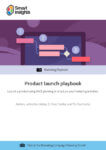A newly launched SaaS will be up against hefty competition and numerous potential customers who have seen it all before.
The owners and administrators of the service can get a quick leg up by following a few tried and true SaaS growth strategies. Compare your strategy against the checklist below, and you’ll be better prepared to achieve your marketing goals for launching your SaaS.
Download Premium Resource – Product launch Playbook
Launch a product using RACE planning to structure your marketing activities. A marketing playbook defines the key messages, types of communications, best practices and optimisation techniques that should be used to maximise return-on-investment for different marketing objectives.
Access the Product launch playbook
1. Get a Plan Together
Too many SaaS marketers try to wing it. They assume they’ll be able to form their plan as they go. They put out a campaign, check the analytics, test the results, and tweak—that’s the usual system routine.
Instead, have a plan in place that goes into effect before the service launches, such as months in advance. This way, all the kinks can be worked out ahead of time instead of scrambling at the last minute to get people to pay attention.
A thorough market analysis should be conducted, and it should be clear where your service ranks in the competition hierarchy. If you’re dead last, plan on reaching the top spot quickly, then work your way backward.
How will your SaaS acquire leads and customers? How will you administer your marketing materials as your prospects move through your pipeline? These questions should be answered and thought out ahead of time; then your plan can be executed with precision instead of throwing things at the wall to see what sticks.
2. Identify the User’s Problem
Your SaaS exists because it is intended to fill a gap in the market. Some need hasn’t been addressed, and your service seeks to solve it. That problem that your service is supposed to cure, focus on it and make it the crux of your marketing campaigns. Find the keywords that will make the reader feel the pain of that problem. For instance, if you’re SaaS performs background checks, focus on frustration or anxiety in hiring the wrong person.
Always remember that the problem your user faces may constantly evolve. This is why it is imperative to talk to your sales department, the ones interacting with the customers, to determine why your users turn to you, and how you might do better in the future. Surveys and polls can also help you learn more, allowing you to keep your SaaS delivering the goods long into the future.
3. Create the Right Marketing Collateral
A majority of SaaS research is conducted online. In an ideal situation, you would control all the information out there about your company and its goings-on. Make that happen by administering collateral in the form of Ebooks, Whitepapers, and Free Digital Products, which are excellent pieces of value you can trade to your audience for contact information.
An ebook can tease a solution to the common problem, and then you can sell the SaaS at the end. A Whitepaper can give facts and figures as to why the SaaS is a necessity in the marketplace; and free templates, images, and other digital elements can be offered to get prospects’ attention.
Webinars, blog posts, trade shows, press releases, PR, and emails are also excellent ways to get the word out about your new SaaS.
Pair the above with a killer landing page, and you can start emailing your list right away, which is essentially now your own private marketing audience.
4. Tell a Story With Your Emails
Email happens to be the top method SaaS’s use to generate demand because it works. Once you have your prospects’ contact information, don’t just bombard them with sales pitches, ads, and discount announcements. Instead, get their attention by telling a story infused with emotion.
Discuss the problem at hand and depict a person so frustrated, they’re practically tearing their hair out looking for an answer. Your prospects don’t know how useful your SaaS is, and they won’t care unless you give them a reason to care.
Remind them how painful their current situation is by telling a story, then give them the big reveal. There is, in fact, a solution to their problem, and - it just so happens -you have the download link.
5. Consider a Free Trial
The best way to entice a customer to buy from you is to give him or her a free sample. Grocery stores have their staff hand out snacks, just as your organization should be handing out free downloads in exchange for the prospects’ identifying information.
A free trial allows the user to test the functionality and assess the SaaS’s usefulness in addressing the need as mentioned above. Most trial recipients won’t cancel as long as that need is solved. And if the person cancels after the trial has ended, you’ll still have the lost customer’s contact information to hopefully nurture them back someday in the future.
6. Ask for the Share
The moment a user downloads your SaaS for the first time, whether as part of the free trial download or an honest-to-gosh purchase, ask them to share their decision on their favorite social networks. This moment is when the user is excited to learn of a solution to the frustrating problem they’ve been facing. Ask them to share your product, and they might give you a rave on all the social channels, bringing, even more, leads your way.
7. Start Gathering Reviews
The moment your user list begins to rise is the time you should start asking for reviews of your SaaS and testimonials as to how well it works. While you’re at it, start asking for referrals, as every one of your customers is a chance to influence at least one other person within their web of contacts.
8. Paid Advertising
Paid ads using Google Adwords, Facebook Advertising, and LinkedIn advertising should be used, but don’t get too hung up on big budgets and bidding wars. Focus on the problem you are attempting to solve and attract your users to you subtly. Focus your ads on telling a story rather than selling, and let them discover on their own how well your SaaS saves the day.
Whatever you do, don’t forget to activate retargeting for your campaigns. Your audience may need to see your offerings a few times before they commit. A retargeted ad can follow a prospect across all social channels, and various locales on the web. Keep your SaaS top of mind, and your sales are sure to improve.
9. Build a Community
Don’t allow all those shares you requested to exist in a vacuum. Water them, nurture them and encourage them to help your web of influence grow. Each time your SaaS is shared, respond and ask open-ended questions. Get involved in the conversation, and the ones who matter will eventually begin paying attention.
10. Go Above and Beyond with Customer Service
All the marketing in the world will not sustain your SaaS unless the product is iron-clad. The service should be tested and your customer service team must be top-notch. All complaints should be given top priority and fires should be snuffed the moment they flare to life.
Above all, do your best to satisfy unhappy customers with a lower rate, free month, or personalized one-on-one service at no extra charge. These customer service “touches” help to endear you to the customer, which can help to develop trust and loyalty. Then, if the customer’s opinion does turn around, ask for the share and a testimonial to keep the leads-a-flowing.
Download Premium Resource – Product launch Playbook
Launch a product using RACE planning to structure your marketing activities. A marketing playbook defines the key messages, types of communications, best practices and optimisation techniques that should be used to maximise return-on-investment for different marketing objectives.
Access the Product launch playbook

Thanks to Ryan Gould for sharing their advice and opinion in this post. Ryan is the Vice President of Strategy and Marketing Services at
Elevation Marketing, a B2B marketing agency. Ryan helps medium and large brands improve sales and market share by developing integrated marketing experiences distinguished by research, storytelling, engagement, and conversion. You can follow him on
Twitter or connect on
LinkedIn.




 Thanks to Ryan Gould for sharing their advice and opinion in this post. Ryan is the Vice President of Strategy and Marketing Services at
Thanks to Ryan Gould for sharing their advice and opinion in this post. Ryan is the Vice President of Strategy and Marketing Services at 


